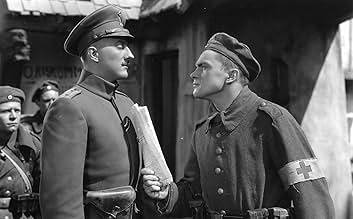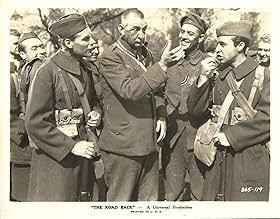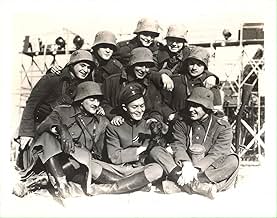Agrega una trama en tu idiomaAfter World War I, a group of former German soldiers try to adjust to civilian life.After World War I, a group of former German soldiers try to adjust to civilian life.After World War I, a group of former German soldiers try to adjust to civilian life.
- Dirección
- Guionistas
- Elenco
John 'Dusty' King
- Ernst
- (as John King)
Larry J. Blake
- Weil
- (as Larry Blake)
- Dirección
- Guionistas
- Todo el elenco y el equipo
- Producción, taquilla y más en IMDbPro
Opiniones destacadas
This anti-war film follows the lives of some German soldiers who find difficulty adjusting to life after the horrors of the front-line in World War I.
This film is often considered a spiritual follow up of sorts to the movie considered the first classic of the talkie era, All Quiet on the Western Front (1930). Like that one, this one is unusual in that it follows the 'enemy' side, the Germans. I think, though, this decision was more expedient than outreaching in the cases of both films in that by doing so it allowed the screenwriters to criticise the authorities more, as it was the German rulers who were the recipients of the anti-war sentiments. Still, it must also have humanised the German enemy for many viewers and this is obviously no bad thing. It is also notable for being directed by James Whale, who was one of the directorial masters of his day, in particular for his classic horror movies for Universal. So, this studio used him to helm this film but they found themselves with a very controversial movie, one which was bluntly critical of the then new Nazi regime in Germany. As a consequence, the Nazis demanded changes to the movie, which if not met would result in all Universal films being banned from that nation. With this huge threat to its European distribution prospects, the studio buckled and the film was partially re-shot and re-edited. It lost much of its power in the process. The remaining film has some interesting things about it but it pales significantly when compared to All Quiet on the Western Front and its overall dynamics are not especially strong or compelling enough to make this no more than an interesting footnote in movie history.
This film is often considered a spiritual follow up of sorts to the movie considered the first classic of the talkie era, All Quiet on the Western Front (1930). Like that one, this one is unusual in that it follows the 'enemy' side, the Germans. I think, though, this decision was more expedient than outreaching in the cases of both films in that by doing so it allowed the screenwriters to criticise the authorities more, as it was the German rulers who were the recipients of the anti-war sentiments. Still, it must also have humanised the German enemy for many viewers and this is obviously no bad thing. It is also notable for being directed by James Whale, who was one of the directorial masters of his day, in particular for his classic horror movies for Universal. So, this studio used him to helm this film but they found themselves with a very controversial movie, one which was bluntly critical of the then new Nazi regime in Germany. As a consequence, the Nazis demanded changes to the movie, which if not met would result in all Universal films being banned from that nation. With this huge threat to its European distribution prospects, the studio buckled and the film was partially re-shot and re-edited. It lost much of its power in the process. The remaining film has some interesting things about it but it pales significantly when compared to All Quiet on the Western Front and its overall dynamics are not especially strong or compelling enough to make this no more than an interesting footnote in movie history.
It's basically a sequel to ALL QUIET ON THE WESTERN FRONT, with only Slim Summerville left from the original cast. The screenplay is ambitious, covering four subplots, and I should note that Andy Devine gives a fine performance; it's also nice to watch a camera travel over the slightly redressed exteriors from The Hunchback of Notre Dame.
That said,there's one minor flaw and one major one. The minor one: it's too glossy. ALL QUIET in an exercise in chaos and despair and the battered, crazy shots are part of what make it so good. The world the vets return to is just as chaotic, but everything is glossy, well orchestrated in camerawork and that fights the inherent message.
I could live with that, but the dealbreaker is John "Dusty King. Those of you have seen the Coen brothers' HAIL CAESAR will recall the cowboy star from that movie. He can ride a horse upside down and backwards and rope three steers at the same time. What he can't do is speak two words together, and somehow the New York office wants him to star in a sophisticated comedy. So he does.
Well, that's John "Dusty" King. In what was essentially the Lew Ayres role from ALL QUIET, Mr. King must be the central observer and moral center of the movie. He must speak long speeches. He must tell his leading lady -- an Andrea Leeds type who sounds just like him -- that she can't help him figure out these things, little lady. He stinks up the joint. Within a couple of years he would retreat to B westerns in which he would occasionally sing, and good riddance to him.
A pleasant woman who likes to sit in the front row was telling me that the consideration of what was Remarque's writings on PTSD make it a good film. There's no doubting the intentions, but if intentions were all that mattered, Ed Wood Jr. Would have been a great film maker.
That said,there's one minor flaw and one major one. The minor one: it's too glossy. ALL QUIET in an exercise in chaos and despair and the battered, crazy shots are part of what make it so good. The world the vets return to is just as chaotic, but everything is glossy, well orchestrated in camerawork and that fights the inherent message.
I could live with that, but the dealbreaker is John "Dusty King. Those of you have seen the Coen brothers' HAIL CAESAR will recall the cowboy star from that movie. He can ride a horse upside down and backwards and rope three steers at the same time. What he can't do is speak two words together, and somehow the New York office wants him to star in a sophisticated comedy. So he does.
Well, that's John "Dusty" King. In what was essentially the Lew Ayres role from ALL QUIET, Mr. King must be the central observer and moral center of the movie. He must speak long speeches. He must tell his leading lady -- an Andrea Leeds type who sounds just like him -- that she can't help him figure out these things, little lady. He stinks up the joint. Within a couple of years he would retreat to B westerns in which he would occasionally sing, and good riddance to him.
A pleasant woman who likes to sit in the front row was telling me that the consideration of what was Remarque's writings on PTSD make it a good film. There's no doubting the intentions, but if intentions were all that mattered, Ed Wood Jr. Would have been a great film maker.
In the years following WWI, slowly the former Allied Powers came to realize that this war was a pointless waste of lives. As a result, there were many war films of the 1930s that humanized the German enemy and discussed this new view of this awful war. The problem is, although films like "J'Accuse" and "All Quiet on the Western Front" were right...the timing was poor, as it encouraged these countries to disarm and see the Germans very favorably....just as Hitler was coming into power! Of these anti-war/pro-German films, "The Road Back" is probably the most unfortunately timed, as only a very short time later, the world's love of Germany began to diminish quickly--with Nazis taking over Austria and Czechoslovakia and Kristalnacht, in which Jews were slaughtered. Not surprisingly, the American audiences were no longer eager to see the Germans as victims...and "The Road Back".
The irony to all this is that the original book (by Erich Maria Remarque--the same man who wrote "All Quiet on the Western Front") DID have a strong anti-Nazi message and COULD have been a very effective film in preparing the world for the Nazi menace. Unfortunately, the studio removed this from the film in an attempt to make the movie acceptable abroad...especially in places that were pro-German! In the end, however, no one wanted the picture--the Germans STILL didn't think it was pro-German enough and folks who were scared of the mounting German aggression were not in the mood for such a film! Ultimately, it ended up being shown very few places.
The story begins in the final days of WWI. A group of German soldiers who have managed to remain alive and remain friends are trying to make it out of the war alive. Most do...only to find life back home is not at all easy nor pleasant. Communists at home are calling for revolution and officers returning from the front are attacked. Additionally, food shortages, no jobs and a broken economy spell disaster for the men and their families. In other words...life really sucked. And, it gets even worse when one of them kills a man. Why? Watch the film to find out for yourself.
While the film does not come out with an overtly pro-Nazi message because the Nazis are never mentioned, the film's covert message seems to be "Germany was a mess...until the Nazis came and brought peace and prosperity". Despite this and its strong anti-Communist message*, the German government banned the film anyway. I guess Hitler and his comrades just weren't taking any chances with this movie...though it sure seems like it would have been effective pro-German propaganda if used by them--especially if you chopped off the confusing and unnecessary minute of the picture. As for the quality of the film, it is exceptionally well made and if it weren't for its pro-Nazi bent, it would be a very good film.
* By the way, both the Communists AND Nazis were tearing the nation apart during this post-war period. Both promised prosperity...provided you gave them a free hand to deal with problems their way! Often, this resulted in gun fights in the streets between the two factions....though the film never mentions the Nazi part in all this violence.
The irony to all this is that the original book (by Erich Maria Remarque--the same man who wrote "All Quiet on the Western Front") DID have a strong anti-Nazi message and COULD have been a very effective film in preparing the world for the Nazi menace. Unfortunately, the studio removed this from the film in an attempt to make the movie acceptable abroad...especially in places that were pro-German! In the end, however, no one wanted the picture--the Germans STILL didn't think it was pro-German enough and folks who were scared of the mounting German aggression were not in the mood for such a film! Ultimately, it ended up being shown very few places.
The story begins in the final days of WWI. A group of German soldiers who have managed to remain alive and remain friends are trying to make it out of the war alive. Most do...only to find life back home is not at all easy nor pleasant. Communists at home are calling for revolution and officers returning from the front are attacked. Additionally, food shortages, no jobs and a broken economy spell disaster for the men and their families. In other words...life really sucked. And, it gets even worse when one of them kills a man. Why? Watch the film to find out for yourself.
While the film does not come out with an overtly pro-Nazi message because the Nazis are never mentioned, the film's covert message seems to be "Germany was a mess...until the Nazis came and brought peace and prosperity". Despite this and its strong anti-Communist message*, the German government banned the film anyway. I guess Hitler and his comrades just weren't taking any chances with this movie...though it sure seems like it would have been effective pro-German propaganda if used by them--especially if you chopped off the confusing and unnecessary minute of the picture. As for the quality of the film, it is exceptionally well made and if it weren't for its pro-Nazi bent, it would be a very good film.
* By the way, both the Communists AND Nazis were tearing the nation apart during this post-war period. Both promised prosperity...provided you gave them a free hand to deal with problems their way! Often, this resulted in gun fights in the streets between the two factions....though the film never mentions the Nazi part in all this violence.
Remarque's novel (which I haven't read) Der Weg zurück/The Road Back is a sequel to his All Quiet on the Western Front. Whale's (or rather Universal's) The Road Back has Slim Summerville as Tjaden again and mentions the names of Kat, Detering and Paul Bäumer in order to directly tie on the preceding film's success. Without success. Surely, The Road Back has a great first half, but, alas, a second half which does not hold up very well. Whale's excellent talent in directing is apparent, but as soon as the German soldiers arrive at home after World War I, it drifts too much into sentiment and pathos, without holding back the one or the other really powerful scene, (especially the one in the mental hospital) and some truly wonderful performances by Slim Summerville and Andy Devine. The choreography of the mass scene towards the end is impressive as well (which resembles Eisenstein's famous Odessa shots a lot). So, it's not really forgettable, but slight disappointment nonetheless.
Saw this at what is now presumed to be the final Cinefest, a Syracuse festival of old films that never get shown, and it was a highlight. An antiwar epic that was Whale's followup to "Show Boat," and two more different films can't be imagined, it's an impassioned look at the last days of World War 1 from the Germans' perspective, and the aftermath. Whale worked from a good screenplay by R.C. Sheriff (he'd also filmed Sheriff's "Journey's End" years before), and the war sequences are quite stunning. What hurts the film is some probably studio-imposed comic relief in the second half, undercutting the strong drama, and a leading man, John King, who simply wasn't up to it. But there's an excellent supporting cast, including Slim Summerville, whose role is partly but not entirely comic, and who shows subtleties his comic performances couldn't contain. Other unexpected people turn up, like Louise Fazenda and Dwight Frye, and the third act allows for some fine antiwar sermonizing that's still pertinent. It's superbly designed and directed, and one wishes it could be shown more.
¿Sabías que…?
- TriviaFearful that this film would not do well overseas, the new regime at Universal Pictures severely edited the film before release, removing much of the strongly anti-Nazi slant that author Erich Maria Remarque included in the original novel, and which director James Whale intended to retain in the film version.
- ConexionesFeatured in Now You See Him: The Invisible Man Revealed! (2000)
Selecciones populares
Inicia sesión para calificar y agrega a la lista de videos para obtener recomendaciones personalizadas
Detalles
- Tiempo de ejecución
- 1h 40min(100 min)
- Color
- Relación de aspecto
- 1.37 : 1
Contribuir a esta página
Sugiere una edición o agrega el contenido que falta


























